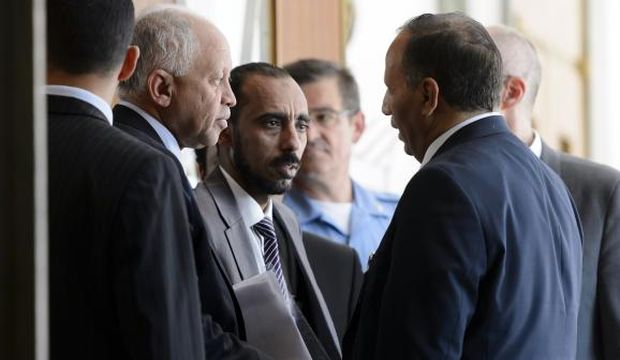
Yemeni Foreign Minister Riyadh Yassin (L) speaks with members of his delegation after a meeting during Yemen peace talks at the United Nations offices in Geneva, Switzerland, on June 19, 2015. (AFP Photo/Fabrice Coffrini)
Riyadh, Asharq Al-Awsat—The Houthi delegation which attended the UN-sponsored Geneva peace consultations on Yemen made little contribution to the talks, with most efforts coming from the country’s internationally recognized government, Yemen’s Foreign Minister Yassin Riyadh told Asharq Al-Awsat on Saturday.
The talks, which began last Monday, ended on Friday without an agreement being reached for a ceasefire, despite the UN’s encouragement. The government had said it would be open to the truce so long as the Houthis agreed to abide by the UN Security Council’s Resolution 2216 on Yemen stipulating the Houthis withdraw from Sana’a and other areas under their control.
A Saudi-led coalition of Arab partners is currently targeting the group in Yemen following a request by the government to restore political legitimacy to the country following the Iran-backed group’s coup in February.
Speaking via telephone from the Swiss city following the end of the talks, Yassin described the Houthi delegation as being like “ghosts” in the Swiss city, and added that the Shi’ite group’s “intransigence led to the failure of Resolution 2216 . . . on whose basis we agreed to the UN’s invitation to Geneva to attend the talks.”
The Houthis also did not follow UN Secretary General Ban Ki-moon’s recommendation that the talks should in principle be viewed as being between two sides, the government and the Houthis. The UN previously said its role would be limited to bringing the two sides to the table.
“The consolations between the legitimate government [on one side] and the Houthis and their allies [on the other] did not reach a single point of agreement. We were not able to even exchange any ideas nor did we come any closer in terms of agreeing on the [basic] principles,” Yassin said.
“It seems the Geneva consultations were ‘consultative’ from one side only. UN Envoy Ismail Ould Cheikh Ahmed met with us [the government] and we discussed how we could implement Resolution 2216 as well as all the preparations we have made [to put the resolution into effect] since the invitation to Geneva was made.”
Yassin added that the government did not receive any new ideas for how the resolution could be put into practice from Ould Cheikh Ahmed, and “the UN were just listening [to suggestions] from one side only—that is, Yemen’s legitimate government.”
“We also did not hear anything from the other side [the Houthis], due to their lack of organization, not even having their papers in order, and generally not knowing what they wanted to get out of the Geneva conference—they were not even in agreement amongst themselves.”
The Houthis had arrived later than scheduled to the Swiss city following disagreements over who would be included in their delegation. An earlier plane meant to be carrying the Houthis to Geneva landed in the Swiss city empty.
Diplomatic sources told Asharq Al-Awsat the members of the Houthi delegation had had their passports confiscated on arrival in Geneva by the authorities since they had not arrived using the correct plane—taking a private jet from Djibouti instead—and had not obtained the necessary visas.
Since the UN had not received the final list of the delegates from the Houthis, it therefore could not inform the Swiss authorities of the names of those who should have special dispensation to enter the country. The delegation is due to leave Geneva for Djibouti, then heading to Sana’a, today. The sources said the Houthis would have their passports returned upon leaving the country.
Yassin said the government had advised the UN not to hold talks including the group outside Yemen, since they were “a mere gang of militias” without international legitimacy.
Yemen’s current crisis began in September 2014 when the Houthis’ militias occupied the capital Sana’a, also spreading to other areas in the country. The Iran-backed group then launched a coup in February, placing President Abd Rabbuh Mansur Hadi and members of the cabinet under house arrest.
Hadi escaped a month later heading to Riyadh, where he requested Saudi Arabia and its Arab partners to intervene militarily in Yemen in order to quell the Houthi coup and restore political legitimacy in the country.
